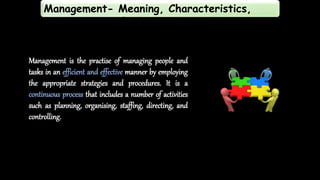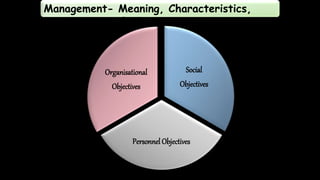Introduction to business management
- 1. Management- Meaning, Characteristics, Importance, Nature, Functions By: Sakshi Business Management & Human Resource Management Class- 1 (In Hindi) Class : 12, BBA, MBA , M.com, UGC-NTA NET
- 2. Management- Meaning, Characteristics, Importance and Objectives Management is the practise of managing people and tasks in an efficient and effective manner by employing the appropriate strategies and procedures. It is a continuous process that includes a number of activities such as planning, organising, staffing, directing, and controlling.
- 3. Management- Meaning, Characteristics, Importance and Objectives
- 4. Management- Meaning, Characteristics, Importance and Objectives Management, has therefore, beendefined as a process of getting things done withthe aimof achievinggoalseffectivelyand efficiently. Process Effectively Efficiently
- 5. Management- Meaning, Characteristics, Importance and Objectives Efficiency in management means performingactivitieswiththe minimum wastage of resources whichalso refersto optimum utilization of resources so that the organisation can maximize the profit. Effectiveness in management refers to the capabilityof the management to achieve the desiredtargets in the specifiedtime. It is concerned with doingwhat is right or what should be done.
- 6. Management- Meaning, Characteristics, Importance and Objectives Characteristics Goal- oriented process All pervasive in nature Multi- dimensional Continuous Process Group Activity Dynamic Function
- 7. Management- Meaning, Characteristics, Importance and Objectives Social Objectives Personnel Objectives Organisational Objectives
- 8. Management- Meaning, Characteristics, Importance and Objectives Management helps in achieving group goals Management increases efficiency Management creates a dynamic organisation Management helps in achieving personal objectives
- 9. Management- Meaning, Characteristics, Importance and Objectives Top Level Management MiddleLevel Management LowLevelManagement These top level managers are responsible for the welfare and survival of the organisation. They analyse the business environment and its implications for the survival of the firm. It is the link between top and lower level managers. They are subordinate to top managers and superior to the first line managers. Foremen and supervisors comprise the lower level in the hierarchy of the organisation. Supervisors directly oversee the efforts of the workforce. Their authority and responsibility is limited according to the plans drawn by the top management.
- 10. Styles of Manager 01 Alsoknownasliassez freestyle Classic Leadership Style 02 Autocratic Leadership Style 03 Democratic Leadership Style 04 Entrepreneurial Leadership Style Completecontrolover employees Combinationof both classicandautocratic style Ownershiporientation
Editor's Notes
- © Copyright PresentationGO.com – The free PowerPoint and Google şÝşÝߣs template library









